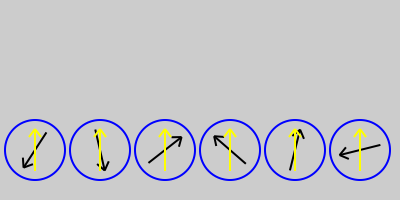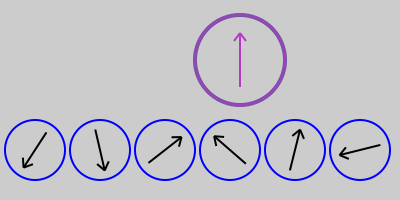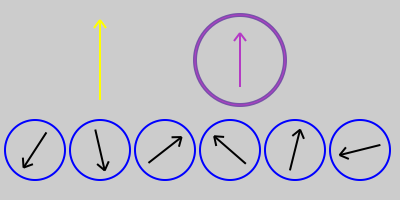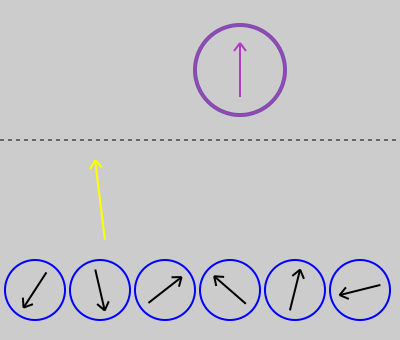Modeling Morality
Previous posts (1, 2, and 3) presented several visual models of morality from atheistic and theistic perspectives. These posts used a definition of morality as being an ill-defined “distance” measurement between “is” and “ought.” Based on the subsequent article The Mechanism of Morality, I’ve revised the definition. Morality is how self-aware agents describe searches through goal space to a goal state. Something that leads to a goal state is considered good, while something that leads away from a goal state is considered bad. Whether or not a goal state is good depends on its relation to other goal states. If there are ultimate goal states (whatever they might be), then there are ultimate goods.
Here, six different models are presented. Three are from an atheistic worldview and three are from a theistic worldview. An arrow represents the direction and location of a “moral compass,” which represents goal states that are deemed to be “good.” The arrows, being static, may suggest a fixed moral compass. At least for humans, we don’t have fixed goals (cf. here and here), so that a moving arrow might be a better representation. However, I’m not going to use animation with these pictures.
These models will be used in later posts when examining various arguments that have a moral basis, since in many cases, the model is assumed and an incorrect model will lead to an incorrect argument. Of course, this begs the question of which model corresponds to reality.
The first three models assume an atheistic worldview.
 Model #1
Model #1
The first model is simple: morality is internal to self-aware goal seeking agents. There is no external standard of morality, since there is no purpose to the universe.
 Model #2
Model #2
This model just adds an external moral standard. What that standard might be isn’t specified here and is the subject of much speculation elsewhere. In the model, no agent’s moral compass aligns with the external standard, reflective of the human condition that we don’t always choose goals that we know we should.
If morality is related to goal seeking behavior, then what might be the goal(s) of nature? Why should any other moral agent conform to the external standard?
 Model #3
Model #3
Here, a common moral standard is not found in “nature,” but is internal to each agent. It reflects the idea that man is basically born “good,” but, over time, drifts from a moral ideal. As before, it reflects the common experience that we don’t choose what we ought to choose.
The next three models reflect various theistic views.
 Model #4
Model #4
This model reflects that God, and only God, defines what is good and that such goodness is internal to God. Moral agents are expected to align their compasses with God’s. Either God reveals His moral compass to man, or man can somehow discern God’s moral compass through the construction of nature. I will argue that this model is not suitable for this phase of history when model #6 is presented.
 Model #5
Model #5
This model adds an external standard to which both God and moral agents should conform. This view of the model shows a “good” god, i.e. one who always conforms to the external standard. This model is frequently assumed in arguments that try to show that God is morally wrong, by attempting to show that God’s moral compass is not aligned with some external standard.
This model, regardless of the orientation of the external compass, is a flawed model (at least in Christian theology) since God is not subject to any external standard. This should be obvious since everything “external” to God was created by God and is therefore subject to Him.
 Model #6
Model #6
In this model, God exists apart from all other moral agents and is the source of His moral compass. Within creation, however, He has decreed a moral standard to which moral agents should conform. In terms of goal space, His goals are not always our goals.
I think that the Bible makes it clear that:
Similarly, Leviticus 19:18 says, “You shall not take vengeance or bear a grudge against any of your people, but you shall love your neighbor as yourself: I am the LORD.” God reserves vengeance for Himself: “Vengeance is mine, I will repay.” [Heb 10:30].
That this model is correct from a Bible perspective should be more obvious than it is; after all, we “see through a glass darkly.” He is God and we are not. The Creator sets the goals/rules for His creation; yet He has His own goals/rules.
These models provide a framework for how various answers to questions about morality arise. Consider the question, “Is the difference between good and bad whatever God says it is? Or is God good because he conforms to a standard of goodness?” Note that this question is really asking “what is correct model of theistic morality?”
With model #4, the answer would be “God is good because He Himself is the standard for goodness.”
With model #5, the answer is “He conforms to a standard of goodness.”
With model #6, the answer is “both.” For us, the difference between good and evil is whatever God says it is. For God, He is His own standard of goodness. He determines the goals we are to pursue and, in this life, those goals aren’t necessarily the goals He pursues for Himself.
Here, six different models are presented. Three are from an atheistic worldview and three are from a theistic worldview. An arrow represents the direction and location of a “moral compass,” which represents goal states that are deemed to be “good.” The arrows, being static, may suggest a fixed moral compass. At least for humans, we don’t have fixed goals (cf. here and here), so that a moving arrow might be a better representation. However, I’m not going to use animation with these pictures.
These models will be used in later posts when examining various arguments that have a moral basis, since in many cases, the model is assumed and an incorrect model will lead to an incorrect argument. Of course, this begs the question of which model corresponds to reality.
The first three models assume an atheistic worldview.

The first model is simple: morality is internal to self-aware goal seeking agents. There is no external standard of morality, since there is no purpose to the universe.

This model just adds an external moral standard. What that standard might be isn’t specified here and is the subject of much speculation elsewhere. In the model, no agent’s moral compass aligns with the external standard, reflective of the human condition that we don’t always choose goals that we know we should.
If morality is related to goal seeking behavior, then what might be the goal(s) of nature? Why should any other moral agent conform to the external standard?

Here, a common moral standard is not found in “nature,” but is internal to each agent. It reflects the idea that man is basically born “good,” but, over time, drifts from a moral ideal. As before, it reflects the common experience that we don’t choose what we ought to choose.
The next three models reflect various theistic views.

This model reflects that God, and only God, defines what is good and that such goodness is internal to God. Moral agents are expected to align their compasses with God’s. Either God reveals His moral compass to man, or man can somehow discern God’s moral compass through the construction of nature. I will argue that this model is not suitable for this phase of history when model #6 is presented.

This model adds an external standard to which both God and moral agents should conform. This view of the model shows a “good” god, i.e. one who always conforms to the external standard. This model is frequently assumed in arguments that try to show that God is morally wrong, by attempting to show that God’s moral compass is not aligned with some external standard.
This model, regardless of the orientation of the external compass, is a flawed model (at least in Christian theology) since God is not subject to any external standard. This should be obvious since everything “external” to God was created by God and is therefore subject to Him.

In this model, God exists apart from all other moral agents and is the source of His moral compass. Within creation, however, He has decreed a moral standard to which moral agents should conform. In terms of goal space, His goals are not always our goals.
I think that the Bible makes it clear that:
- God is not only “good,” but He defines “goodness.”
- There are “goods,” as shown by His behavior, that man is not permitted to pursue. That is, what is good for God isn’t necessarily good for man, which would be the case if there were a common moral compass.
Similarly, Leviticus 19:18 says, “You shall not take vengeance or bear a grudge against any of your people, but you shall love your neighbor as yourself: I am the LORD.” God reserves vengeance for Himself: “Vengeance is mine, I will repay.” [Heb 10:30].
That this model is correct from a Bible perspective should be more obvious than it is; after all, we “see through a glass darkly.” He is God and we are not. The Creator sets the goals/rules for His creation; yet He has His own goals/rules.
These models provide a framework for how various answers to questions about morality arise. Consider the question, “Is the difference between good and bad whatever God says it is? Or is God good because he conforms to a standard of goodness?” Note that this question is really asking “what is correct model of theistic morality?”
With model #4, the answer would be “God is good because He Himself is the standard for goodness.”
With model #5, the answer is “He conforms to a standard of goodness.”
With model #6, the answer is “both.” For us, the difference between good and evil is whatever God says it is. For God, He is His own standard of goodness. He determines the goals we are to pursue and, in this life, those goals aren’t necessarily the goals He pursues for Himself.

